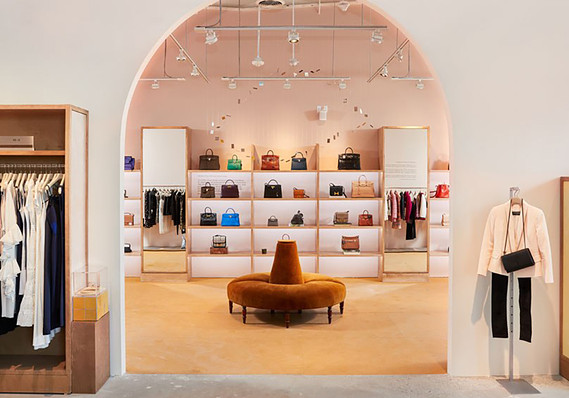
With the secondhand retail market well on its way to becoming a $51 billion business, The RealReal, an online marketplace for consigned luxury items, has filed for an initial public offering.
The company set its terms on Monday, expecting to raise up to $285 million and be valued at $1.57 billion.
Underwriters for the deal are led by Credit Suisse, BofA Merrill Lynch and UBS Investment Bank. If the underwriters exercise all of their options to buy up to 2.25 million additional shares of stock, The RealReal could raise as much as $327.8 million.
The RealReal is offering 15 million shares priced between $17 and $19 per share. It is expected to trade on the Nasdaq under the ticker “REAL.” Post-IPO, the company will have 82.7 million shares outstanding.
The RealReal uses proprietary technology and trained experts to sell consigned luxury goods across categories ranging from women’s, men’s, kids, home and art.
Read: Neiman Marcus, H&M join growing list of brands that are tapping the secondhand market
“Luxury goods retain value over time as a result of their enduring desirability and durability, making them particularly well-suited for resale,” the prospectus says, with The RealReal quoting data that shows the total addressable market in the U.S. for luxury goods at $198 billion.
Key to the company’s success is growing its network of consignors, which feeds the pipeline of quality goods and attracts shoppers, and leads to increased commissions for the consignors themselves. The RealReal says it paid a cumulative total of $987.7 million in commissions through March 31, 2019.
The company, which was incorporated in Delaware in March 2011 and has its headquarters in San Francisco, generates revenue from digital orders and three retail store locations in New York and Los Angeles. Total revenue in 2018 was $207.4 million, up from $133.9 million the previous year. The company had a net loss of $75.8 million in 2018, and expects to incur losses into the future.
The RealReal processed 1.6 million orders in 2018, up 42% year-over-year, with an average order value of $446, up 2% from 2017. The company had 416,000 active buyers in about 60 countries in 2018.
ThredUp, another player in the secondhand business, forecasts that the resale sector will reach $51 billion by 2023, and will be larger than fast fashion in a decade.
And with closets now twice the size of 30 years ago, according to Yerdle, a tech company for resale businesses, there’s plenty of supply.
Also: Revolve closes its first trading day up 90%
“Our success depends on our ability to cost-effectively attract retain and grow relationships with consignors, and in turn, our supply of luxury goods sold through our online marketplace,” The RealReal wrote. Sales professionals are key to sourcing these items.
“The process of identifying and hiring sales professionals with the combination of skills and attributes required in these roles can be difficult and can require significant time,” the prospectus said.
Here are five more things to know about The RealReal ahead of its IPO:
It plans to use part of the proceeds from its IPO for charity
The RealReal plans to use most of the proceeds from its IPO for working capital and expenses. But 1%, or more than $3 million if the deal prices at the top if the indicated range and the extra shares are sold, will go to The RealReal Foundation, which was formed to “engage in charitable activities.”
The RealReal will also use $300,000 to pay a lender under a term loan facility. Some of the proceeds may also go toward investments in technologies, products or services.
There are no plans to pay a dividend for the foreseeable future.
And: 5 insane Amazon Prime perks you probably don’t know about
Its business has a sustainability message
In addition to touting its authenticated luxury goods, The RealReal talks up the sustainable attributes of being in the secondhand business.
“We have built a vibrant marketplace that promotes the recirculation of luxury goods and contributes to a more sustainable world,” the prospectus said.
In a letter to current and future stockholders, Chief Executive Julie Wainwright reiterated the company’s eco-conscious attributes.
“Our buyers and consignors are motivated by the awareness that recirculating luxury products (and recouping some of their original investment) is not just good for them personally, but good for the planet,” the letter said. “Since The RealReal’s inception, the fast-fashion market has exploded making fashion disposable and is a key contributor to the estimated dump-truck-per-second of apparel added to landfills, according to a report by the Ellen MacArthur Foundation.”
The RealReal’s pricing depends on other retailers and brands
The value that customers see in The RealReal’s products is dependent on the pricing of luxury goods when items are brand new.
“In order to attract buyers to our online marketplace, the prices for the pre-owned luxury goods sold through our online marketplace may need to be lowered in order to compete with these pricing strategies, which could negatively affect gross merchandise value and in turn, our revenue,” the prospectus said.
The RealReal’s gross merchandise value in 2018 was $711.0 million.
The company has experienced losses due to fraud, and could again.
The RealReal has taken a hit due to customer use of stolen credit-card numbers, unauthorized purchases and other forms of fraud.
“In addition to the direct costs of such losses, if the fraud is related to credit card transactions and becomes excessive, it could result in us paying higher fees or losing the right to accept credit card for payment,” the prospectus said.
It could open the company up to a lawsuit or regulatory action as well.
Don’t miss: Lululemon stock hits record high as Wall Street lauds ‘exceptional’ results
The RealReal is already being sued by Chanel, and could face litigation from others.
The RealReal was sued by Chanel in November 2018, alleging that The RealReal “misrepresented certain counterfeit Chanel products as authentic Chanel products, that our resale of Chanel products confuses consumers into believing that Chanel is affiliated with us and involved in authenticating consignors’ goods and that only Chanel is capable of authenticating secondhand Chanel goods,” says the prospectus.
The lawsuit is in the early stages, and could lead to other lawsuits from Chanel and other luxury brands, especially if the outcome isn’t in The RealReal’s favor.
In some cases, the goods The RealReal receives are counterfeit, according to the prospectus. Though the company says it has invested heavily in processes to weed out fakes, it can’t be certain to catch every one, which poses a threat to the company’s reputation.
“As the sophistication of counterfeiters increases, it may be increasingly difficult to identify counterfeit products,” the prospectus said.
The RealReal could also be held legally responsible for unlawful consignor activity.







